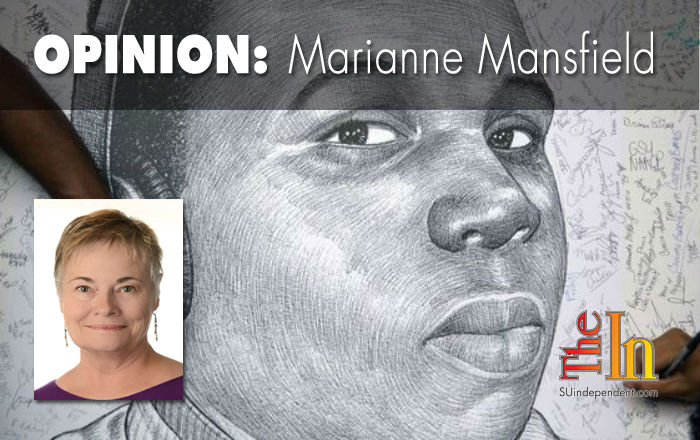
Written by Marianne Mansfield
Watching Ferguson, MO burn was like watching a train wreck. Though I’ve never seen a train wreck, I think that phrase refers to the inevitability of a disaster about to happen. Two trains hurling toward each other on the same track are bound to collide. Two human entities, protesters, some few of whom were hell-bent on violence and destruction, and police authorities hell-bent on defending life and property hurling toward each other are bound to collide in a fiery confrontation.
The certitude of the violence in Ferguson, MO is being sliced and diced by mainstream and social media alike. I’m not going to add my voice there. Other than to say I am saddened in my soul by the images I’ve seen.
Rather, my question is, why do we watch? Why did I?
Glued to the TV, wrapped in an afghan against the cool desert night, I stayed up long after my normal bedtime, watching first CNN and then MSNBC. Despite the fact that the reports reached a soaring level of redundancy by around 10 PM, I stayed longer. Even after switching off the TV, I found it difficult to sleep, wondering what was happening.
I’d like to say my reasons for watching sprang from a healthy curiosity about the cultural implications of the events in Ferguson. Or, I’d like to say that I was motivated by a righteous indignation about the injustices being portrayed. And to a certain extent, both would be true. I also must acknowledge, however, that neither of these justifications on their own, or combined, fully accounts for my interest.
My motivation to watch, I’m learning, is more convoluted than that. Although my psychology classes are now nearly 40 years in my review mirror, I suspect that my willingness to watch and to continue to watch the video feed of the looting and rioting in Ferguson springs from a much more egocentric source. I simply can’t imagine myself participating. Ever. So I was enthralled with seeing what it looked like since there is absolutely no chance I would ever be there in person.
I’ve attended my fair share of candlelight vigils and silent stand-ins, but never a riot.
I am not totally an innocent when it comes to mob behavior, however. I was a college freshman in Ohio, in the spring of 1970. Miami University was not as active a campus as Kent State, but we staged our share of sit-ins, sidewalk chalking, and marches. On one sunny afternoon a large gaggle of us took over the ROTC building, operating under the horribly misguided and naive belief that if we could impede the supply of would-be soldiers, we might be able to hinder our country’s war effort. An effort we viewed as unjust. The speeches our leaders gave were inspiring and the solidarity I felt with the other students around me was heady. I thought we might actually be on to something. And yet, when it was announced that Ohio State Patrol officers were on their way to cart us off to jail, I was one of the several who got out of the building as quickly as possible, with little acknowledgement given to how cowardly we appeared. Because I was a coward. I was terrified of being arrested.
No such fear seemed to show on the faces that flashed across my TV screen on the night of November 24. What I read in them instead, was a volatile mix of pent-up anger and a recklessness borne of an emotional disconnect with the community they were destroying.
I watched because I would never be there, in large part because they were experiencing a rage I have never felt. I was curious. Their passion hasn’t been mine, because my actions have never been driven by that intensity of pain. I hope they never are.
What I didn’t understand from the chaos of Ferguson on November 24, I could begin to grasp from the protests nationwide on the evening of November 25. By speaking a language of peaceful protest and not in the face of the authorities, their message came through to me, loud and clear. There is a festering injustice in our country, and it is long past time to root it out. As a nation we must rise against the number of senseless killings of young black citizens. But violence doesn’t work. Martin Luther King warned us and we should heed it.
He said, “Injustice anywhere is a threat to justice everywhere.”
That is why I will continue to watch but with a clearer purpose. I will watch to see how our country handles the injustice. Injustice against African Americans, against police authorities, against peaceful protesters.
We should all be watching.
Marianne Mansfield has lived in Southern Utah since 2010. She and her husband followed their grandchildren to this area from Michigan. In her former life she was a public school educator. More than half of her career was spent as an elementary principal, which is why her response to most challenges is, “This isn’t my first rodeo.” She grew up in Indiana, and attended Miami of Ohio, Ball State University and Michigan State. She is a loyal MSU Spartan and Detroit Tiger baseball fan. She has been writing fiction and opinion since her retirement in 2004.
Follow The Independent on Facebook Google+ Twitter Instagram Tumblr LinkedIn
Small Business Saturday Sponsor





